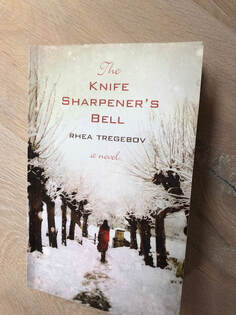 Continuing my series of articles based on books I have read during the lockdown, The Knife Sharpener’s Bell by Rhea Tregebov is a story that attracted my attention as it unites several of my areas of interest. It begins in depression-era Winnipeg – depicting the time and place that my father was born – with the story of Annette Gershon whose father owns a delicatessen on Main Street, close to Selkirk Avenue. This is the area where my father grew up, on Flora Avenue just two blocks from Selkirk, in the old Jewish North End. And like Annette’s family, my Dad’s parents too had immigrated to Winnipeg from Russia. The North End was where the Eastern European Jews settled, where they recreated the shtetl they had left behind in the Old Country, opening up Jewish bakers, kosher butchers and grocery stores selling all their traditional foods. In the book, the Gershons eat the same dishes that my Dad remembered from childhood – chicken soup, potato knishes, dill pickles. Annette’s parents had come to Canada before the Russian Revolution, during the reign of Tsar Nicholas II, who had encouraged anti-Semitic mobs known as the Black Hundreds to rage pogroms against the Jews. They arrived in 1914, the same year that my great-great uncle Menachem Mendl came to Winnipeg with his family, in a race against time for his two sons to avoid conscription to the Russian Army when the First World War broke out. But here the similarities between my family and the fictional Gershons end. Unlike my family, the Gershons have given up their Jewish customs and traditions, becoming true believers in Soviet-style socialism. In contrast, Menachem Mendl almost didn’t make it out of Russia in time because he had dithered so long, wanting his sons to avoid going into the army, but at the same time unwilling to commit himself to what he called ‘das treyfe land’ – the unkosher country. He was a deeply religious man and feared for the future of Jewish customs in the West. When the Great Depression hit in the 1930s, the Gershons saw it as devastation wreaked by the ills of the capitalist system. Mass unemployment and plunging incomes devasted families, children went hungry and the rate of suicide increased. They longed for the Worker’s Paradise of the Soviet Union where unemployment didn’t exist and the planned economy replaced the cycle of boom and bust. The book opens with nine-year old Annette trying to stop a train to prevent her father from travelling to the Soviet Union. He plans to go first and bring his family to join him later. This dramatic farewell takes place at a railway station that was central to my grandparents’ lives. My grandfather worked on the railways and he and my grandmother later owned a small restaurant next door called Cooper’s Lunch Bar. Once, in the Soviet Union the Gershons settled in Odessa and tried to make the best of their new life. Annette was a teenager in 1941 when the Germans invaded. All the Jews who could prepared to leave Odessa ahead of the Nazi occupation, heading for the Urals or Central Asia. All except for Annette’s extended family, who refused to part from their beloved city. Only Annette and her brother departed for Moscow, while her parents remained on the platform at another train station and were still in Odessa when the Nazis invaded. The tragedy of Ukraine’s Holocaust by Bullets, the shooting of naked men, women and children beside mass graves that they were often forced to dig themselves is too abominable and too well known for me to need to elaborate on it here. But it wasn’t the only form the Holocaust took in Ukraine. There were also random shootings in the streets, groups gathered together then set on fire to burn to death, and some were deported to death camps elsewhere. The war and the Holocaust decimated Annette’s extended family, leaving her more alone and rootless than ever. In the early years of the Soviet Union, the Jews had enjoyed an unprecedented level of equality and freedom after centuries of repression. But by 1950 the age-old prejudices had crept back and the anti-Semitism of Stalin’s final years left no Jew safe. Model employees with an unblemished record suddenly lost their jobs, accused of imagined crimes or being enemies of the people. Annette’s fate lay in the hands of a merciless State.
0 Comments
Leave a Reply. |
Keeping stories aliveThis blog aims to discuss historical events relating to the Jewish communities of Ukraine, and of Eastern Europe more widely. As a storyteller, I hope to keep alive stories of the past and remember those who told or experienced them. Like so many others, I am deeply troubled by the war in Ukraine and for the foreseeable future, most articles published here will focus on the war, with an emphasis on parallels with other tumultuous periods in Ukraine's tragic history. Archives
March 2024
Categories
All
|
 RSS Feed
RSS Feed
